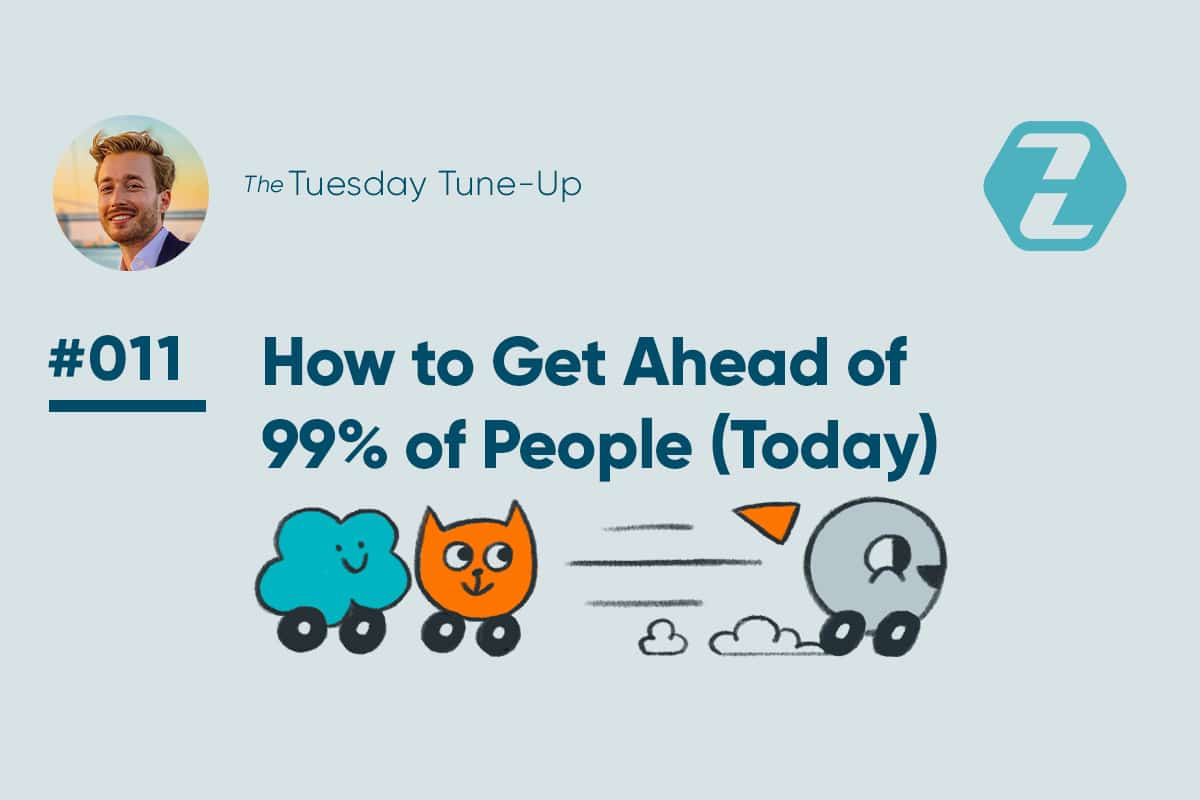
If you repeated the same actions you did today for the next ten years, would you be where you want to be? Or even further away?
Most people will watch this video, say, “Interesting,” and return to being the 99%. I’m not trying to bait you; it’s just true.
The key question is, are you ok with being average? If so, then that’s fine; do precisely that. And there seriously isn’t anything wrong with that. The problem comes when you don’t want to be average, but your actions are average. If that’s the case, like it was for me, then this disconnect between our thoughts and behaviors, called cognitive dissonance, makes us feel awful. That’s why you clicked on this post.
But let’s do it. No waiting for the perfect moment, no endless planning—just immediate action. Here’s how you can make a massive leap forward right now.
By the end of this post, you will learn:
- How the top 1% got there
- How to be in the top 1% of your field
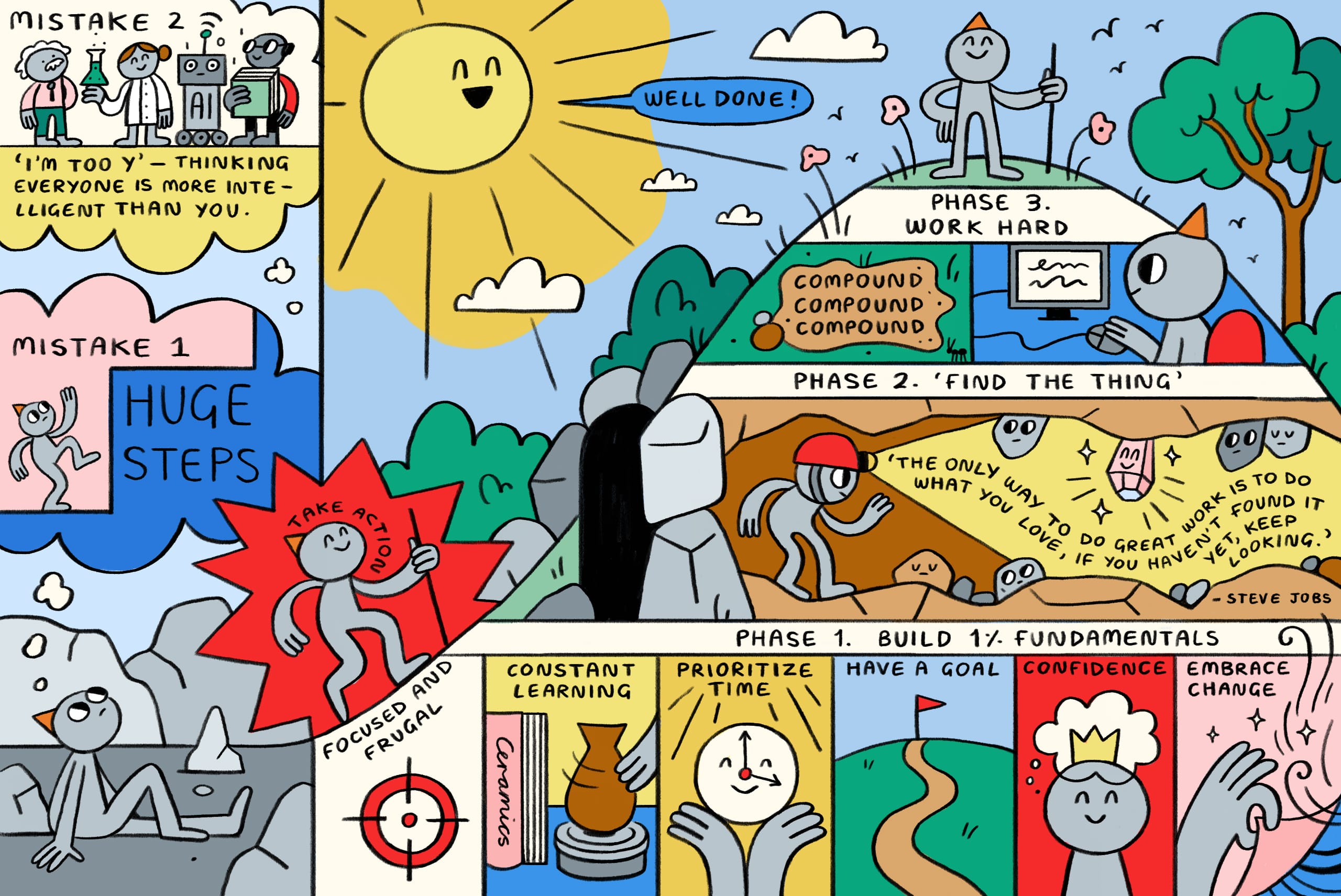
Two mistakes you need to wrap your head around first:
Mistake #1 – Huge Steps
The common mistake nearly everyone makes is that if I want to accomplish this huge thing, I need to take a huge amount of time to plan my actions, and then learn, and then, finally, take huge steps and become a success right away. However, these huge steps are so monumental that I would never even attempt the first step. It’s out of my reach. It’s beyond me. I can’t fly to Mars in a spaceship, earn 100 million dollars, or play in the NBA.
You actually can.
Mistake #2 – I’m too “Y”
The other mistake is that being a success is more challenging than ever. Everyone is more intelligent or better than you. With AI, the rapid development of technology, the saturated market, my age, my youth-I can never get to where these other people are.
But, actually, because there are so many great things in the world, the opportunity is greater than ever. Everyone is hooked up, tuned in, and hypnotized by all the fantastic stuff, and it is easier than ever to stand out among them. Fast food, TikTok, instant gratification, and more and more and more is the motif of the 21st century in the developed world.
The average person spends 11 years of their life on the phone and ten years in front of the TV. That’s about 40 hours a week.
Think about five random friends of yours. How much TV do they watch? How many days a week are they out drinking or goofing off? I bet you can predict where their lives will be in 5-10 years.
Again, this comes off as harsh, but really, really, I think it’s okay if you do these things as long as you actually want to do them.
The critical distinction is whether or not you want to be that person, in that place, or working that job in 5-10 years. If you do, then fine, keep doing what you are doing, but, if you don’t, what the hell are you doing? Why haven’t you changed? A lightning bolt isn’t going to launch you into the top percentile. You have to do it yourself. You have to take action. This is where I am trying to help—to change, to improve. To do something terrifying that you have never done before.
If you want to be ahead of 99% of people, you can’t be like 99% of people. Crazy right?
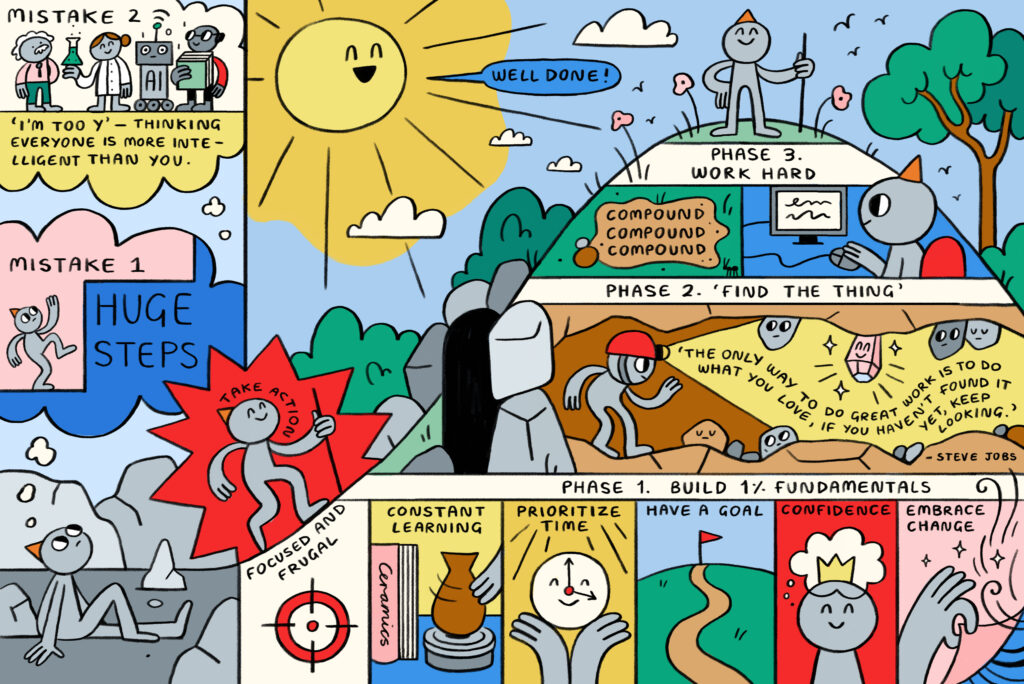
If you repeated the same actions you had today for the next ten years, would you be where you want to be? Or even further away?
In the biography of Anthony Bourdain, Laurie Woolever wrote, “This life isn’t a green room for something else. He went for it.”
This life isn’t a green room for something else. Go for it. None of us are getting out of here alive.
Do you want to stay the same?
I don’t.
Okay, as promised, we will now take action. Or, if you are inspired enough right now and know what needs to be done, please click off this video and go do it—build the thing, call the person—take action.
But here’s how I would start. Remember, we are playing a long-term game here, not one month, not one year, but a 10, 20, or even 50-year game.
Phase 1: Build 1% Fundamentals
Most of life is searching for the thing you need to do.
To find it, though, you need to build the fundamentals. To be ready for the moment when you can indeed be the best in the world. Most people who win have some things in common, they are:
- Extremely focused and extremely frugal – Paul Graham’s advice to new YC founders
- Curious and constantly iterating – Thomas Edison famously blew up 1000 lightbulbs before success
- Prioritize time – Warren Buffet is one of the staunchest defenders of his time ever, spending 80% of every day learning, reading, and thinking.
- Have a goal – Elon Musk was on the brink of losing it all multiple times with SpaceX, but he knew his goal, so his next steps were easy.
- Have confidence – Muhammad Ali’s claim that he was “The Best” wasn’t just a marketing tactic; he really convinced himself he was the best, and so, he was.
- Embrace Change – Netflix versus Blockbuster.
Those are the abstracts. What are some ways this could be specifically implemented?
- Focused and Frugal: Achieve one daily task that aligns with your vision, set the time aside, and finish the work. Slowly build the muscle of focused work; it will change your life.
- Constant Learning – what are you curious about? Now, learn about it once a day by reading a book or article for 30 to 60 minutes a day. This habit of reading will quickly make you among the top 10% of all people. Even better, do the thing for 60 minutes daily: write code, write a book, film videos, and make art.
- Prioritize Time – Spend 1 hour less on your phone and 1 hour more on the above two things.
- Have a goal—this is the hardest part. We will get into this later, but what does your dream life look like? What is your vision? How are you going to change the world? Write it down today.
- Confidence – now, you can fake it, but the best way to do it, I think, is to truly earn it. Doing the above will help you earn it.
- Embrace Change – doing the above things, today, is hard. Actually do it. Be excited by it, imagine what you will be like in a year if you actually did what you set out to do!
Some final heuristics:
- Short-term pain for long-term gain always
- Get rid of the easy things in every aspect of your life: exercise more, eat better, floss your teeth, prioritize your happiness, say no to things, and create homework for yourself for the thing you are interested in.
- Expose yourself to the people you want to be like by listening, reading, and watching everything about them.
Okay, you’ve been doing phase 1 for a couple of months and feel motivated. You’ve taken care of your body and brain and are working hard. Now what? Congratulations, we are at the part where most people fail.
Phase 2: Find the Thing
This is the hardest part, yet the most important.
How do you find the thing that you want to put everything into?
Naval Ravikant says, “Most of life is searching for what and who needs you the most. […] Find your genuine curiosity, not what’s hot right now.”
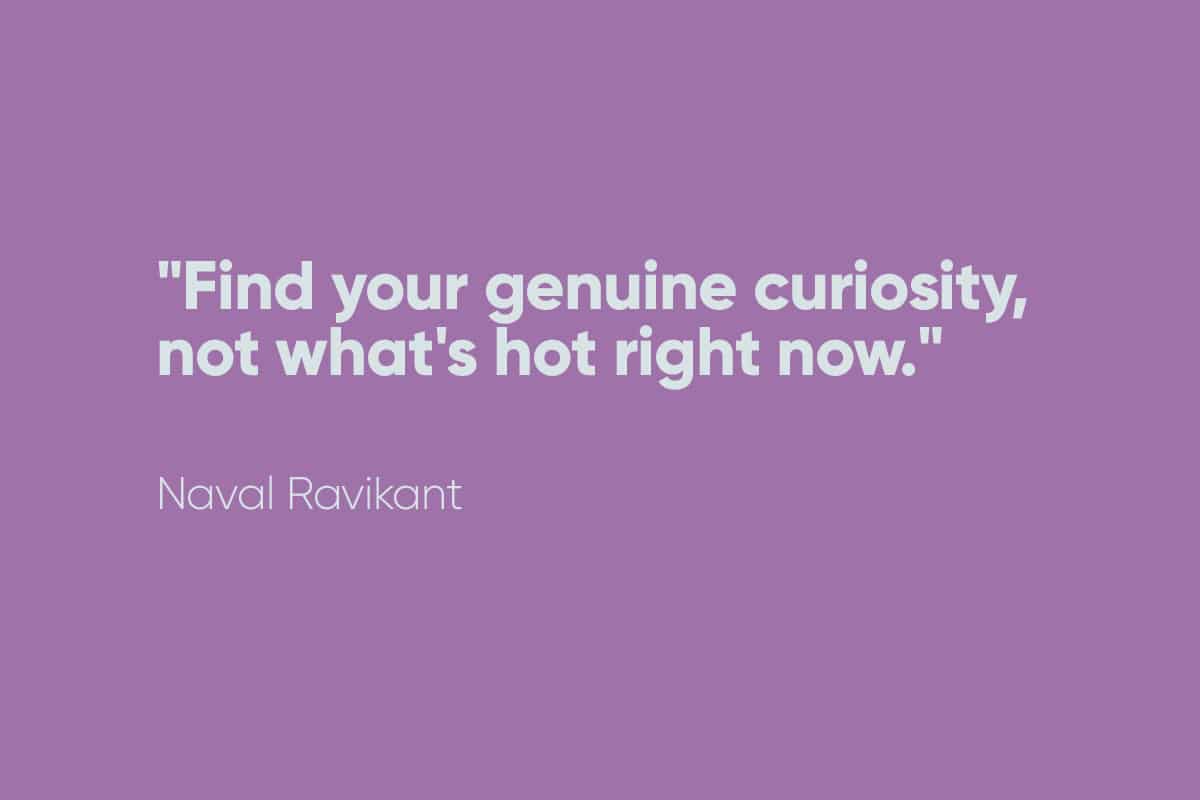
I don’t know my thing; I am still trying to find it, and that’s okay.
The only way to do great work is to love what you do. If you haven’t found it yet, keep looking. Don’t settle.
Steve Jobs
It could take you 10, 20, or 30 years to find the thing, but when you find it, you will do more work in 1 year on that thing than others do in 10 years; you will be in the 1%. So you would catch up to someone who only kind of likes what they are doing for 30 years in three years. After that it’s all gravy baby.
But finding the thing is tough, how do we do it?
By trying a bunch of things until the great thing reveals itself. Answer these questions:
- What is work to others and play to you?
- What is excitingly ambitious to you?
- What could you do for the next 30 years and be excited to do it? Paul Graham says, “If it entertains you now but will bore you someday, it’s a distraction.” Keep looking. I strongly recommend his essay, Do Great Work.
- What do other people ask you for help with?
- What do you think about when you are doing the things you “have to” do?
Okay, so let’s assume you found the thing. Congratulations! You have beaten me. What do we do next?
Phase 3: Work hard on the Thing (for a long time)
Compound, compound, compound. Once you’ve found the thing, it gets easier but isn’t easy.
There will be good days and bad days. But, if in your heart, you know this is the thing, you must work hard.
The best performers in the world are not only genuinely excited about their work but also work extremely hard on it.
Warren Buffet says big money is not in the buying and selling but in the waiting.
- If you go for one run a week for one year, you’ve gone on 52 runs. But the fantastic part is that you are probably a little bit better with every run. So you run a little faster, get strong, improve your physical and mental health, and then the next week, you are (on average) a little better… and so on.
- If you invest $10 daily into an index fund with an average annual return of 10%, you will have $630,000 in 30 years. The total of all those $10 investments is about $100,000. If you put that money in at the beginning of 30 years and just left it, that would be nearly $2,000,000.
- If you commit 30 minutes daily to learning something new, that’s 182 hours a year. Imagine that time spent on language, programming, or business. Now imagine doing an hour a day? Two hours a day?
The hardest part, of course, is consitency, which is why 99% of people don’t get there.
Set it and forget it.
The most powerful interventions I’ve done for my life are making a plan 12 weeks at a time, using the 12-week year, and then just trusting the past Zach. I stick to the plan. Sometimes, I hate it and think I should really really be working on this new cool thing! But I always trust past Zach, and then, maybe, in the new 12-week cycle, I can plan something new.
Because Zach in the past was thinking about compounding, Zach in the present is a directionless monkey brain that gets pulled into everything in his line of sight.
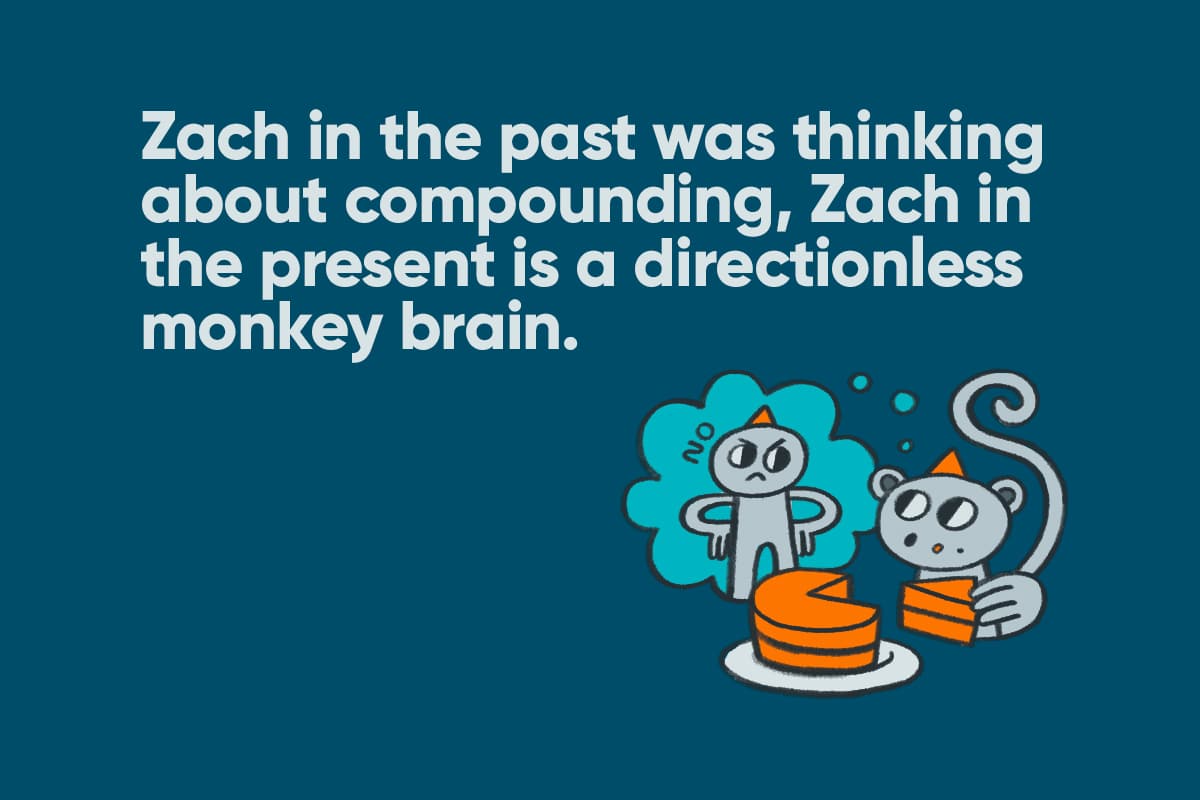
Overall:
When in doubt, choose short-term pain for long-term gains. Every time.
- Don’t fall into the trap of thinking you are too “y” or you need to win right away
- Build 1% fundamentals of focus, learning, liking change, and confidence
- Find the thing – this is hard
- Work on the thing (for a long time) to inevitably win from compounding
I hope this was helpful! This is the actual action plan I am taking with myself. I beg you not just to take notes on this video, or save the post, or anything like that, but seriously, and precisely, plan plan plan to make your dreams come true. Plan the next 12 weeks based on the above, then reevaluate at week 13 and do it again.
